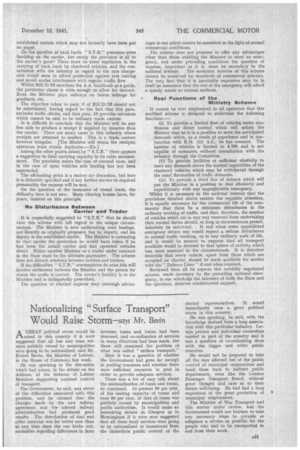Nationalizing "Surface Transport" Would Raise Storm—says Mr. Bevin A GREAT political
Page 23

If you've noticed an error in this article please click here to report it so we can fix it.
storm would be raised in this country if it were suggested that all bus and tram services publicly owned by municipalities were going to be nationalized, said Mr. Ernest Bevin, the Minister of Labour, in the House of Commons last week.
He was speaking in the discussion which had arisen, in the debate on the Address, at the instance of Labour Members supporting national control of transport.
The Government, he said, was aware of the difficulties associated with this problem, and he claimed that the changes made by the new railway agreement and the altered railway administration had produced good results. The distribution of coal and other material was far better now than at any time since the war broke out, anomalies regarding differences in fares between buses and trains had been removed, and co-ordination of services in many directions had been made, but there still remained the problem of what was called "surface transport."
Here it was a question of whether the Government had gone far enough in pooling`resources and whether there were sufficient resources to pool in order to provide adequate services.
There was a lot of easy talk about the nationalization of buses and trams, he continued. At present 90 per cent. of the seating capacity of trams and over 60 per cent, of that of buses was publicly owned by municipalities and public authorities. It would make an interesting debate in Glasgow or in Birmingham if it were now suggested -that all these local services were going to be nationalized or transferred from the immediate public control of the
elected representatives. It would immediately raise a great political storm in this country.
He was speaking, he said, with the knowledge derived from a long association with this particular industry. Certain private and individual ownerships existed in part of the country and it was a question of co-ordinating them with the bigger and wider public concerns.
He would not be prepared to take all the men affected out of the public control of municipal corporations and hand. them back to indirect public departments, even like the London Passenger Transport Board, without great thought and care as to their future well-being. He had had a long experience of the great protection of municipal employment.
The Minister of War Transport had this matter under review, and the Government would not hesitate to take any necessary steps to provide as adequate a service as possible for the people who had to be transported to and from their work.




















































